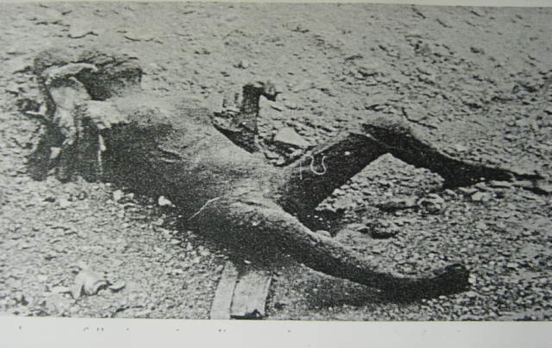by WILLIAM BLUM
 A child victim of the Tokyo bombing. “The US deployed air power in a campaign to burn whole [Japanese] cities to the ground and terrorize, incapacitate, and kill their largely defenseless residents, in order to force surrender.” PHOTO/Japan Focus
A child victim of the Tokyo bombing. “The US deployed air power in a campaign to burn whole [Japanese] cities to the ground and terrorize, incapacitate, and kill their largely defenseless residents, in order to force surrender.” PHOTO/Japan Focus
Some thoughts on “patriotism” written on July 4
Most important thought: I’m sick and tired of this thing called “patriotism”.
The Japanese pilots who bombed Pearl Harbor were being patriotic. The German people who supported Hitler and his conquests were being patriotic, fighting for the Fatherland. All the Latin American military dictators who overthrew democratically-elected governments and routinely tortured people were being patriotic — saving their beloved country from “communism”.
General Augusto Pinochet of Chile, mass murderer and torturer: “I would like to be remembered as a man who served his country.” 1
P.W. Botha, former president of apartheid South Africa: “I am not going to repent. I am not going to ask for favours. What I did, I did for my country.” 2
Pol Pot, mass murderer of Cambodia: “I want you to know that everything I did, I did for my country.” 3
Tony Blair, former British prime minister, defending his role in the murder of hundreds of thousands of Iraqis: “I did what I thought was right for our country.” 4
At the end of World War II, the United States gave moral lectures to their German prisoners and to the German people on the inadmissibility of pleading that their participation in the holocaust was in obedience to their legitimate government. To prove to them how legally and morally inadmissable this defense was, the World War II allies hanged the leading examples of such patriotic loyalty.
I was once asked after a talk: “Do you love America?” I answered: “No”. After pausing for a few seconds to let that sink in amidst several nervous giggles in the audience, I continued with: “I don’t love any country. I’m a citizen of the world. I love certain principles, like human rights, civil liberties, democracy, an economy which puts people before profits.”
I don’t make much of a distinction between patriotism and nationalism. Some people equate patriotism with allegiance to one’s country and government or the noble principles they supposedly stand for, while defining nationalism as sentiments of ethno-national superiority. However defined, in practice the psychological and behavioral manifestations of nationalism and patriotism are not easily distinguishable, indeed feeding upon each other.
Howard Zinn called nationalism “a set of beliefs taught to each generation in which the Motherland or the Fatherland is an object of veneration and becomes a burning cause for which one becomes willing to kill the children of other Motherlands or Fatherlands. … Patriotism is used to create the illusion of a common interest that everybody in the country has.” 5
Strong feelings of patriotism lie near the surface in the great majority of Americans. They’re buried deeper in the more “liberal” and “sophisticated”, but are almost always reachable, and ignitable.
Alexis de Tocqueville, the mid-19th century French historian, commented about his long stay in the United States: “It is impossible to conceive a more troublesome or more garrulous patriotism; it wearies even those who are disposed to respect it.” 6
George Bush Sr., pardoning former Defense Secretary Caspar Weinberger and five others in connection with the Iran-Contra arms-for-hostages scandal, said: “First, the common denominator of their motivation — whether their actions were right or wrong — was patriotism.” 7
Continue reading “The Anti-Empire Report”

 “A protester shouts slogans in front of an ARCO station owned by BP,” in Los Angeles, California. PHOTO/
“A protester shouts slogans in front of an ARCO station owned by BP,” in Los Angeles, California. PHOTO/ A child victim of the Tokyo bombing. “The US deployed air power in a campaign to burn whole [Japanese] cities to the ground and terrorize, incapacitate, and kill their largely defenseless residents, in order to force surrender.” PHOTO/
A child victim of the Tokyo bombing. “The US deployed air power in a campaign to burn whole [Japanese] cities to the ground and terrorize, incapacitate, and kill their largely defenseless residents, in order to force surrender.” PHOTO/